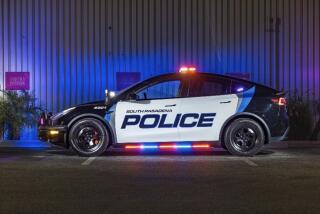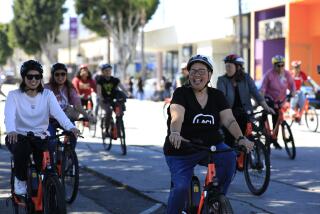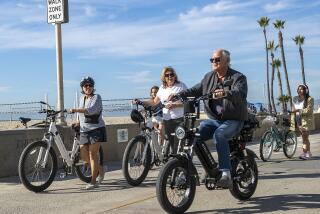Electric Motorcycles Debut in Southland
- Share via
Motorcycle aficionados rumbled into Glendale on Saturday to visit the mobile Harley-Davidson Museum, a shrine in an oversized trailer honoring speed, leather chaps and the internal combustion engine.
But the future may have lain outside, in the shape of four petite motorbikes that sounded more like golf carts than heavy metal thunder.
Saturday was also the Southern California debut of the Lectra, touted as the world’s first electric motorcycle. These hogs are environmentally correct--but a bit slow (maximum of 45 mph) and only good for short trips (they must recharge every 30 miles).
The Lectras are made by a Northern California-based company that is taking them on a weeklong cross-country tour en route to an electric vehicle convention in Orlando, Fla., next weekend. After starting in San Francisco on Friday, the tour made its second stop at Harley-Davidson of Glendale.
Seeing the Lectras was a little rough on some rough riders.
“Those are sissy bikes,” muttered Helen Weakley, 66, of Yakima, Wash.
Neil Schmitt, 84, of Panorama City wasn’t too thrilled either. “What do I think of them?” asked Schmitt, who has been biking since 1930. “I can’t tell you, there’s a lady present.”
Tim Ritson, a ponytailed 45-year-old West Covina mechanic, was more direct: “What the hell would you want with an electric bike?” he asked, waving his tattoo-laced arms. “You need something that makes noise and vibrates.”
But in the 1990s, motorcycles are no longer just about noise and vibration, and the consumers aren’t always born to be wild.
Electric Motorbike Inc. says it is marketing the bikes as commuter vehicles or even for use in--gulp--retirement communities.
Two hundred orders have already been placed, said Sarah Schilke, marketing manager for the company. The Lectra seems to be especially popular in Silicon Valley.
“All the techies really like it,” she said.
Only 10 Lectras have been manufactured so far, Schilke said, but next year the bikes will be available at several motorcycle retailers--including Harley-Davidson dealerships--for about $3,500.
The current model is only intended for surface street use. In fact, pressing the brake recharges the battery. But later versions may travel faster and farther, and be freeway-safe, Schilke said.
The Harley-Davidson Museum was the main attraction Saturday, but as bikers passed from the trailer that housed the museum to the dealership to buy Harley memorabilia, their curiosity often got the better of them.
“They look like something for the moped generation to me,” said Don Simoneau, 37, of Paso Robles as he scoped out the Lectras.
Some skeptical bikers allowed that the Lectras--which without clutches, engines or exhaust pipes are decidedly small--may appeal to children. Others were enthusiastic at the prospect of conserving energy and biking simultaneously.
“I remember for years the problem we’ve had with pollution, with gas,” said Eugene Lobina, 56, an Echo Park auto mechanic. If more people had conserved energy, he said, “we wouldn’t be pushing [Iraqi leader Saddam] Hussein so hard.”
Don’t get him wrong, Lobina’s got his motorcycle bona fides. Riding since 1963, he has owned 10 bikes and still says things like, “I love the smell of gas--the old, leaded stuff.” But he has also seen the changes in the motorcycle world in the past decade and said he thinks that the Lectra’s time may have arrived.
“It’d be a lot better than driving a moped to work,” Lobina said.
That’s what Oliver Shokouh, owner of Harley-Davidson of Glendale, hopes will sell the Lectras. He acknowledges that the quiet purr of the electric motor won’t help. “You’re not going to terrorize the neighborhood.”
Matthew Kraus, 40, a West Los Angeles resident who works for an educational materials distributing company and edits his Harley Club’s newsletter, is convinced that the Lectras will be relegated to the dustbin of history.
“They aren’t going to make enough noise,” he said. “As far as motorcycles go, nothing’s going to beat the engine.”
But his motoring buddy Dennis Benson, a 52-year-old Westchester accountant dressed to ride in a leather jacket and bandanna illustrated with skulls, disagreed.
“It is the thing of the future,” Benson said. “They’re going to have to figure out how to make these things work without gasoline.”






